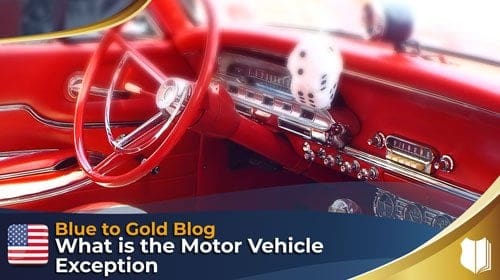

Three Golden Rules of Search and Seizure
These three golden rules come from reading thousands of court cases over the last 20 years and seeing a theme regarding what the courts are
or use our live chat
Customer Service


The automobile, or motor vehicle exception allows officers to search cars for evidence, contraband, and fruits or instrumentalities of crimes without a search warrant. When you ask cops, “What does it take to search these cars?” Many of them will just say, “Probable cause.” Well, let’s be technical,
Technically, legally, there are four factors to consider.
Number One:
Probable cause; what probable cause did you have to search the vehicle? And it only takes a fair probability that evidence will be found in the car, not absolute certainty.
Number Two:
Not on curtilage. If the vehicle is on curtilage, you need something above and beyond the motor vehicle exception to search the car. So for example, if you have probable cause that a car in the back yard has evidence of stolen property inside it, you cannot go into that backyard and search that car under the motor vehicle exception. You need something else, such as the homeowner’s consent, or exigency. Let’s say for example, the person is about to get into the car and drive away. That seems like you have exigency. So you stop the car, detain it, and search it or go get a warrant.
Number Three:
Apparently mobile. Now what this means is that the vehicle appears likely that it can run and drive. But it doesn’t mean that it actually has to be able to run and drive right this second. So for example, if the car has a flat tire, a dead battery or needs gas, then you can still search it. If AAA can get that car moving, then you can search it on the automobile exception. What about the situation where you search the car, but find out later that there was no way it was going to run? For instance, you didn’t know that it was missing a carburetor. Well, that’s not on you. You’re not mechanics. You don’t have to do an inspection of a car to see if it can run before you do a search. So, as long as you reasonably believed that the car could run, or could run with little or no repair, it’s searchable according to the motor vehicle exception.
Number Four:
And finally, the last element is you can only search the car in the same manner as if a judge had given you a warrant. What this means is, if instead of searching with a warrant, what would a warrantless search allow? Well, whatever search was permitted by a judge is the same search that you can do in a motor vehicle exception. So if you’re looking for a stolen MacBook Pro in a car, where would you look? Under the seat or in the trunk, yes. Backpack, eyeglass case, no. What about the engine compartment? Probably not, unless you have some other facts or circumstances indicating that they put it there.
So let’s wrap up the four elements of the motor vehicle search: probable cause, not on curtilage, apparently mobile with little or no repair, and finally, your search was conducted in the same manner as if you had a warrant. That’s what you would need in order to search an automobile.


These three golden rules come from reading thousands of court cases over the last 20 years and seeing a theme regarding what the courts are


This question is: Can you look inside a woman’s purse, or a man’s backpack during a pat down? The answer is, “Maybe.” Here’s how this


Here is the question: Can an officer reach slightly into a person’s home to pull them out and arrest them? If an officer has probable


When is Miranda required during a detention? There is some confusion on this subject. Many officers tell me that Miranda is required when the person
© Blue to Gold, LLC. All rights reserved